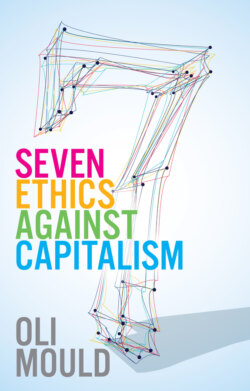Читать книгу Seven Ethics Against Capitalism - Oli Mould - Страница 11
Ethics
ОглавлениеAs Elias and Moraru have intimated, being ethical is part of the conceptualization of planetarity. It is the infectiousness of the commoning procedure. This is an important starting point for thinking ethically, but how can we be ethical? The word ‘ethics’ is used in many fields. There are medical ethics, which operate to guide physicians and other health professionals in their work. All new doctors are required to take the Hippocratic oath, stating that they will do no harm and putting patients’ needs above any other consideration (with or without personal protective equipment). There are legal ethics, which are a set of codified rules, often enshrined in particular national legal frameworks and enforced by dedicated institutions. Within the university context, there are research ethics that each project has to adhere to. Students are given ethics forms to fill out when they are proposing their dissertations. There are business ethics that often appear as ‘codes of conduct’ that a corporation may (or may not) choose to enforce on its employees. People even talk about corporate ethics, which are a tacit ‘agreement’ of sorts that companies and costumers will enter into when transacting. None of these are the ethics that this book will focus on. In fact, these ‘ethics’ are the antithesis of the kind of ethics that will be explored.
This book builds on the idea of ethical thinking as infectiousness, but colours this with the conceptualization of ethics as immanent, and not beholden to any predefined higher power. Essentially, ethics are allowing for the continuation of commoning. Hence, they are not a ‘code of conduct’, but a suite of positionalities that catalyse a planetary commons wherever and however they unfold in real time. If commoning is the realization that an oppressive ideology can be resisted, then ethics are ‘soft articulations’ of how to maintain this resistance. Ethics therefore are ‘immanent’ and always unfolding, rather than some suite of transcendental ideals that are predefined. They take stock of a situation, and are subsequently articulated depending on how the commoning is unfolding. To be ‘ethical’ in this sense is to be guided by the given situation in all its diversity, density and difference, rather than any preconceived or external ‘guide’. Such ethics are fleeting in action, but can become more durable and embedded in the world as they diffuse through the social fabric. This reading of ethics is in the tradition articulated most forcefully by the French radical philosopher Gilles Deleuze, in his sole-authored work but also in the magnum opus he wrote with his co-conspirator Félix Guattari.26 In intricately analysing the notion of ethics within this work, the feminist philosopher Tasmin Loraine has argued that ‘Deleuze and Guattari’s conceptualisation of an immanent ethics calls on us to attend to the situations of our lives in all their textured specificity and to open ourselves up to responses that go beyond a repertoire of comfortably familiar, automatic reactions and instead access creative solutions to what are unique problems.’27
The ‘problem’ of capitalism is far from unique – it is global in its imposition – yet an ethics that aims to resist the myriad of injustices and inequalities can follow the same immanence outlined by Deleuze and Guattari. In other words, opening up spaces to allow recognition and indeed a celebration of the different forms of living justly in this world, beyond the totalizing hegemonic force of capitalism, is an ethical act.
As discussed above, thinking the commons as planetary entails thinking them ethically, in that they are always immanent and unfolding; they are always in a state of becoming the commons in conjunction with a community; the act of commoning. Indeed, Gibson-Graham, with their articulation of commoning, invoke a Deleuzo-Guattarian reading of becoming, arguing that it aids in producing a ‘generative ontological centripetal force working against the pull of essence or identity’.28
Therefore, I want to build on this lineage of thinking ethically that refuses totalizing predetermined forces that can restrain difference, and instead embrace the variance that exists in the world in any given situation, in any given time, in any given place. The ethics I want to outline, then, are first and foremost grounded in this ontology; they are ‘soft’ articulations. They are articulations in that they can be communicated (i.e. via this book) and they are soft because they are malleable, porous and transmutable (i.e. they are necessarily ‘open-source’ – they can be used, adapted and transmogrified). They are behavioural and emotional ‘patterns’ that are constantly in flux, rather than rigid templates to adopt.
What is important to factor into this discussion, however, is that the actualization of this reading of ethics is always related to an event. The ethics are not predetermined or imposed; an event always happens first. In other words, for ethics to have a grounding or indeed something to be ethical towards (other than complete nihilism), they are tethered to, and unfold from, a pre-existing ‘event’. As Deleuze has argued, ‘ethics is concerned with the event; it consists of willing the event as such, that is, of willing that which occurs insofar as it does occur’.29 But just want do we mean when we say ‘an event’?
